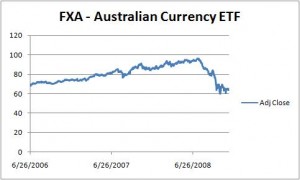FXA – Australian Currency ETF
A very interesting thing about the current financial crisis is the rise of the US Dollar. Its interesting because when economies collapse in other countries – the national currency also crashes. However, as the US economy heads for a deep recession, the dollar gains in strength every day.
The dollar has gained against all major currencies (except the yen), and especially against the Australian Dollar. To put things in perspective, when compared with other currencies, the Australian Dollar did gain significantly more against the US dollar, in the past year or so.
Australia is a resource rich country and exports a lot of its minerals to countries like – China, which will spend a lot on expanding its local infrastructure in the next few years.
The fact that a substantial part of China’s stimulus package is devoted to building infrastructure is good news for Australia. The other positive thing about Australia is that it is one of the few developed countries that have been impacted very little by the global crisis.
How to invest in the Australian Dollar?
For an ordinary investor, the easiest way is – buying an Exchange Traded Fund that tracks the price of the Australian dollar against the US dollar.
Currency Shares Australian Dollar ETF (FXA) does exactly this. Here is a chart of how it moved over the last couple of years.
Here is a list of some other currency ETFs that you may be interested in.
You can invest directly in Forex too, but, that may not be a good option for regular investors as the leverage in Forex is much higher than equities and you may stand to lose a lot of money.
Note: I am not a financial advisor and this should not be treated as a buy recommendation on the ETF.


There are two things to consider when you talk about a country’s economy crashing. One is a value of their goods and services, and the other is the value of the stocks within their country. If stocks crash despite the fact that the world has not stopped valuing those companies products and services, then the currency must go up to balance the value of the companies. Foreign investors will want to buy American currency to own American businesses they see profiting in the future.
If lending increases due to property values going up and the low interest rate then the new currency injected into the system will make the supply of money greater than before the crisis, and we will face inflation. In inflation, the stock market is likely to see a rise, as it will be easier to buy stock at higher prices as the money is worth less.
The economy itself changes slower, and if unemployment increases with businesses shutting down, then you will see an economic crisis that will effect the currency as well. At that point the actual goods and services offered by Americans will be worth less than what they used to be to the world.
Since the US Dollar happens to be the reserve currency of the world as well – the rules governing other currencies do not apply to the USD so strictly.
Like when Iceland went down – their currency Krona took a free fall too. And the Ruble is going down with fall in oil prices in Russia.
But we don’t see that happening with the USD as the Japanese, Chinese Brits and almost everyone holds a lot of USD as their reserves and can’t afford to let the dollar slide by too much.
The problem with saying countries won’t let a currency fail is the high turnover of currency trade. I don’t believe any nation has the stupidity to try to corner the market in an asset that is already set up to have an unlimited supply to keep liquidity high.
I’m not saying America’s money won’t go down in value, as I think it has to at this point with the current fiscal policies. I’m saying that the value of America’s assets have not gone down YET. If unemployment lasts long enough to cause wages to go down and companies lose infrastructure from lack of capital, then what America has to offer will be in great supply at low prices. Deflation and Inflation are spirals that do not effect the economy over night unless what the economy had to offer is worthless overnight.
The strange thing is all economies are terrified of deflation right now meaning many of them technically don’t want their currency going up in value quickly. It’ll be interesting to see if all economies trying to keep their currencies from changing value at the same time will either make all currencies stabalize in value, or cause all currencies to jump wildly for months as governments over estimate the corrections they need.
Like when Iceland went down – their currency Krona took a free fall too. And the Ruble is going down with fall in oil prices in Russia.
Currency Trading Center
********
Justin